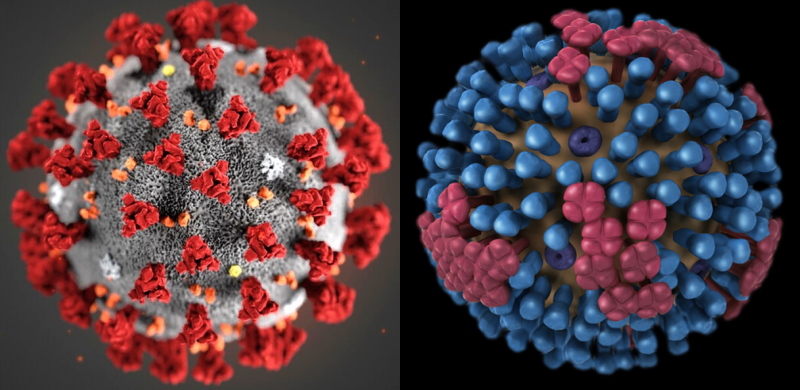COVID-19 vs Influenza, They’re Not The Same
In every metric, COVID-19 is a far more dangerous virus, and it will not go away or become manageable without significant intervention.
COVID-19 and common influenza, the flu, are not the same and their differences are important.
Dr. Ben Weston, director of medical services for Milwaukee County, is one of the local officials that has been working with the Milwaukee County Unified Emergency Operations Center on its response to the disease since the start of the pandemic.
“There have been and continue to be many comparisons of COVID-19 to seasonal influenza or flu,” Weston said. “These discussions often start with statements about why we’re taking all these precautions with COVID-19.”
For starters, COVID-19 kills far more people, far quicker than the flu does. The CDC’s earliest estimates for influenza deaths from the 2019-2020 flu season indicate they could be as high as 62,000 over six months. In less than three months COVID-19 has killed more than 70,000 people in the U.S.
And, Weston said, these deaths occurred under “under fairly strict social distancing. While influenza transmission took place relatively unchecked.”
“Were it to have spread under similar circumstances as influenza, the death rate would have undoubtedly been far, far higher,” he said.
The flu is tempered each year by effective antiviral treatments and vaccines, Weston said. Neither of which exist yet for COVID-19. While a new treatment using a drug called Remdesivir is showing promise, there is not sufficient evidence yet that it is as effective as the common antivirals used to treat the flu.
Weston said there has been a “frantic pace of treatment and vaccination development.”
The one thing we have for both the flu and COVID-19 are the social precautions we use. It’s important for both that we regularly wash our hands, cover our coughs and our sneezes and avoid contact with sick people. That’s because both are viruses spread person to person primarily through droplets in the air.
But the contagiousness of the flu is nothing compared to COVID-19. Someone with the flu typically gives it to one other person, while someone with COVID-19 is likely to give it to three people.
The flu is most contagious when you have symptoms, making it easier to isolate yourself or avoid others that are sick. Unfortunately, Weston said, “One of the most contagious periods with COVID-19 is actually before you even develop symptoms.” Individuals can be asymptomatic for up to 14 days.
Influenza is tempered by a variety of factors, and cases drop dramatically outside of flu season. The same cannot be said yet for COVID-19. “[The disease] with its higher level of contagiousness. Its increased need for hospitalization, its increased rate of death, is not going away any time soon,” Weston said.
If you think stories like this are important, become a member of Urban Milwaukee and help support real, independent journalism. Plus you get some cool added benefits.
More about the Coronavirus Pandemic
- Governors Tony Evers, JB Pritzker, Tim Walz, and Gretchen Whitmer Issue a Joint Statement Concerning Reports that Donald Trump Gave Russian Dictator Putin American COVID-19 Supplies - Gov. Tony Evers - Oct 11th, 2024
- MHD Release: Milwaukee Health Department Launches COVID-19 Wastewater Testing Dashboard - City of Milwaukee Health Department - Jan 23rd, 2024
- Milwaukee County Announces New Policies Related to COVID-19 Pandemic - David Crowley - May 9th, 2023
- DHS Details End of Emergency COVID-19 Response - Wisconsin Department of Health Services - Apr 26th, 2023
- Milwaukee Health Department Announces Upcoming Changes to COVID-19 Services - City of Milwaukee Health Department - Mar 17th, 2023
- Fitzgerald Applauds Passage of COVID-19 Origin Act - U.S. Rep. Scott Fitzgerald - Mar 10th, 2023
- DHS Expands Free COVID-19 Testing Program - Wisconsin Department of Health Services - Feb 10th, 2023
- MKE County: COVID-19 Hospitalizations Rising - Graham Kilmer - Jan 16th, 2023
- Not Enough Getting Bivalent Booster Shots, State Health Officials Warn - Gaby Vinick - Dec 26th, 2022
- Nearly All Wisconsinites Age 6 Months and Older Now Eligible for Updated COVID-19 Vaccine - Wisconsin Department of Health Services - Dec 15th, 2022
Read more about Coronavirus Pandemic here





















